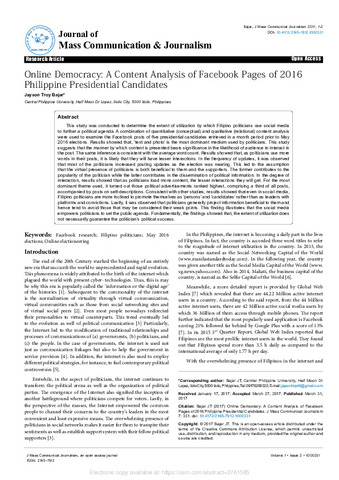Показать сокращенную информацию
Online democracy: A content analysis of Facebook pages of 2016 Philippine presidential candidates
| dc.contributor.author | Bajar, Jayson Troy F. | |
| dc.date.accessioned | 2022-08-03T01:38:42Z | |
| dc.date.available | 2022-08-03T01:38:42Z | |
| dc.date.issued | 2017 | |
| dc.identifier.citation | Bajar, J. T. F. (2017). Online democracy: A content analysis of Facebook pages of 2016 Philippine presidential candidates. Journal of Mass Communication & Journalism, 7(2), 331. | en_US |
| dc.identifier.issn | 2165-7912 | |
| dc.identifier.uri | https://hdl.handle.net/20.500.12852/2187 | |
| dc.description | Journal article | en_US |
| dc.description.abstract | This study was conducted to determine the extent of utilization by which Filipino politicians use social media to further a political agenda. A combination of quantitative (conceptual) and qualitative (relational) content analysis were used to examine the Facebook posts of five presidential candidates retrieved in a month period prior to May 2016 elections. Results showed that, ‘text and photo’ is the most dominant medium used by politicians. This study suggests that the manner by which content is presented bears significance in the likelihood of audience to interact in the post. The same inference is consistent with the average word count. Results showed that, as politicians use more words in their posts, it is likely that they will have lesser interactions. In the frequency of updates, it was observed that most of the politicians increased posting updates as the election was nearing. This led to the assumption that the virtual presence of politicians is both beneficial to them and the supporters. The former contributes to the popularity of the politician while the latter contributes in the dissemination of political information. In the degree of interaction, results showed that as politicians load more content, the lesser interactions they will get. For the most dominant theme used, it turned out those political advertisements ranked highest, comprising a third of all posts, accompanied by posts on self-descriptions. Consistent with other studies, results showed that even in social media, Filipino politicians are more inclined to promote themselves as ‘persons’ and ‘candidates’ rather than as leaders with platforms and convictions. Lastly, it was observed that politicians generally project information beneficial to them and hence tend to avoid those that may be considered their weak points. This finding illustrates that the social media empowers politicians to set the public agenda. Fundamentally, the findings showed that, the extent of utilization does not necessarily guarantee the politician’s political success. | en_US |
| dc.language.iso | en | en_US |
| dc.publisher | Hilaris | en_US |
| dc.relation.uri | https://www.hilarispublisher.com/open-access/online-democracy-a-content-analysis-of-facebook-pages-of-2016philippine-presidential-candidates-2165-7912-1000331.pdf | en_US |
| dc.subject.lcsh | Presidents--Election | en_US |
| dc.subject.lcsh | Elections | en_US |
| dc.subject.lcsh | Facebook (Electronic resource) | en_US |
| dc.subject.lcsh | Content analysis (Communication) | en_US |
| dc.subject.lcsh | Advertising, Political | en_US |
| dc.subject.lcsh | Social media | en_US |
| dc.subject.lcsh | Politicians | en_US |
| dc.subject.lcsh | Presidential candidates | en_US |
| dc.subject.lcsh | Philippines | en_US |
| dc.subject.lcsh | Political campaigns | en_US |
| dc.subject.lcsh | Social media--Political aspects | en_US |
| dc.subject.lcsh | Internet in political campaigns | en_US |
| dc.title | Online democracy: A content analysis of Facebook pages of 2016 Philippine presidential candidates | en_US |
| dc.type | Article | en_US |
| dcterms.accessRights | Publicly accessible | en_US |
| dc.citation.firstpage | 331 | en_US |
| dc.citation.journaltitle | Journal of Mass Communication & Journalism | en_US |
| dc.citation.volume | 7 | en_US |
| dc.citation.issue | 1 | en_US |
| local.subject | Facebook research | en_US |
| local.subject | Filipino politicians | en_US |
| local.subject | May 2016 elections | en_US |
| local.subject | Online electioneering | en_US |
| dc.identifier.doi | 10.4172/2165-7912.1000331 |
Файлы в этом документе
Данный элемент включен в следующие коллекции
-
Journal articles [36]


